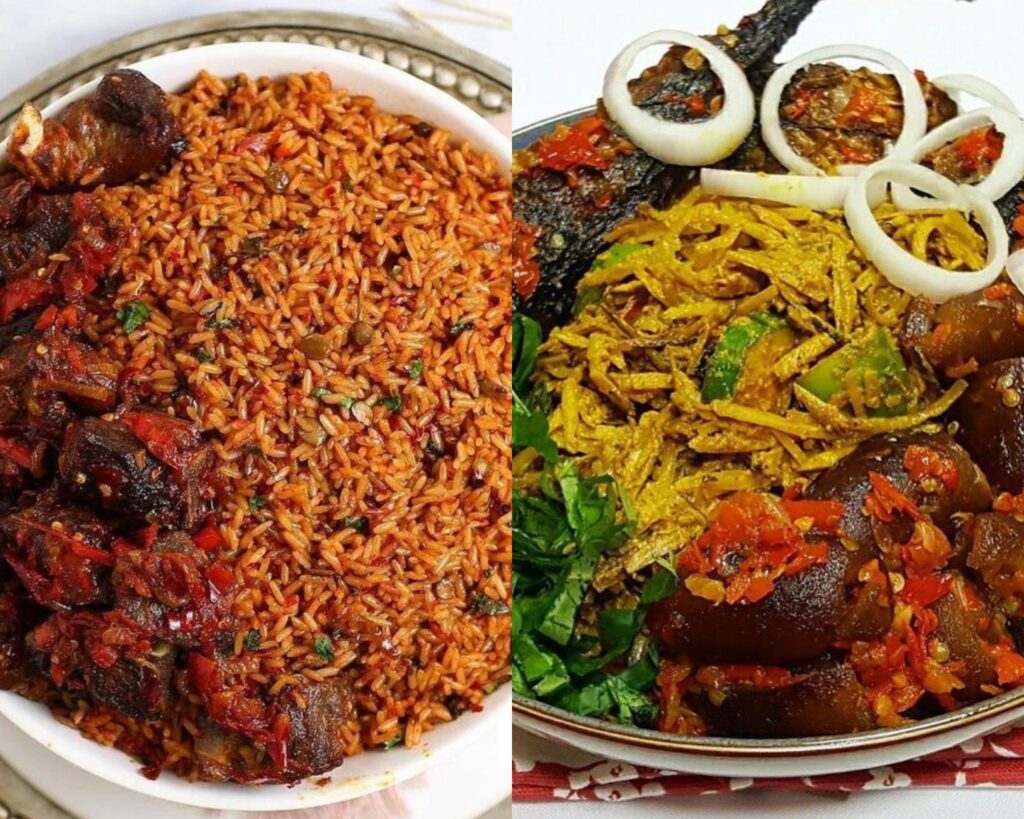On this article, we bring you list of Top Nigerian Food/Dishes.
1. Abacha(African salad) : Abacha, also known as African salad, is mostly consumed in the Eastern region of Nigeria, and the best Abacha is produced in Enugu, they also use it for kola for visitors.
Cassava tubers are the raw material for abacha.
When cassava is processed entirely from scratch, it is gathered, sliced, rinsed, cooked, and sliced into the proper sizes or shapes. Some leave the Abacha to dry under the sun while others cook it immediately.
How to prepare Abacha:
First of all this are the ingredients for preparing Abacha:
Salt, maggi,ehuru,ugba, red oil, crayfish, edible powdered potash, garden egg(optional), utazi leave (optional),dey fish, stock fish.
The procedures:
Soak your Abacha inside hot water if you are using the dried one, then sieve and about 5 minutes and set aside, then you get your red oil and put inside a bowl, then put the potash inside water and sieve inside the oil, then add your salt, fresh pepper, maggi, garden egg or any vegetable you choose to use, then add the Abacha into the bowl and stir evenly.
2. Jellof rice: Nigeria’s national meal, jollof rice, is of Senegambian descent and is served throughout West Africa with some slight modifications in the components. Rice is prepared by cooking it in a hearty tomato sauce so that it will absorb all the flavors.
Some of the ingredients used for making Jellof rice include: Fresh/ tin tomatoes, foil, salt, maggi, meat/ fish or any protein of your choice, onions, Groundnut/ red oil, vegetables, carrot, green beans etc.
3. Eba(Garri): Eba or Garri is actually Nigerian’s most popular dish, it’s not limited to any particular tribe or state, it’s a Nigerian general food.
Eba is actually made from cassava flour and it’s been mixed with hot water and turned with wooden spoon before it’s been eaten. It can be eaten with soup, gbegiri, Edikaikong etc.
4. Pounded yam: Pounded yam is eaten by every tribe of Nigeria, it’s been produced with pounding yam in a mortar or better still using yam poundo machine to pound them into solid state.
The yams are first ground into a smooth paste, prior to they are rolled into balls. Iyan, these pounded yam balls belong to a wonderful category of dishes known as “swallows”, it can be paired with different soups.
5. Amala: In the western parts of the nation, the Yoruba ethnic group consumes Amala, a traditional Nigerian dish. Unripe plantain, yam, and/or cassava flour are used in its production.
It’s challenging to visit any of the neighborhood bukkas in Lagos or any part of Yoruba land without running into this dish, as it’s a well-known Nigerian delicacy.
This Yoruba specialty is quick and simple to prepare, which is wonderful, but if you’re not careful, you could get lumps that make it unpleasant to eat. Relax if you have trouble producing lump-free, fluffy, smooth amala.
6. Bread: Bread is one food that Nigerians don’t joke with, it’s served with lots of delicacies.It’s beeb produced with flour, sugar , eggs and other things. Bread is more like a life saver because if you have one you won’t need to cook another food. It can be paired with, beverages, rice, noodles, drinks etc.
You will likely see bread in every Nigerian home you visit and if you are coming back home from a Journey you are expected to bring one along.
7. Moi moi: Even if Moi Moi isn’t in any way a dessert pudding, you must try it while visiting the nation. Moi moi is a dish made from grinded beans or grinded corn. The method of preparation for the peas is the same as for akara.
They are first soaked to assist separate the skins from the rest of the bean and soften the skins. The final skin removal is made much simpler by gently pulsing the peas in a blender to roughly break them up. The peas are now given a second soak to further soften them before being completely pureed with peppers, onions, water or stock, and occasionally oil to create moi moi.
8. Tomato Stew: You can never go wrong with trying a Nigerian stew, it’s always available in a Nigerian home mostly on Sunday afternoons. It is prepared by either fresh tomatoes or tin tomatoes.
It may be cooked using a variety of meats, including fish, and is incredibly simple to prepare. The only ingredients in tomato stew that are vegetarian-friendly are tomatoes, spices, and oil.
For many Nigerian households, this straightforward recipe brings back fond memories of their own homes. Roasted peppers, chicken, meat, fish or any protein of your choice, curry, thyme, Groundnut oil or red oil, and other spices, some people add cooked eggs too and other spices.












Leave a Reply